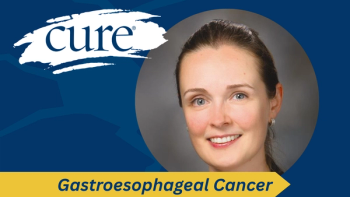
Consider Timing and Presentation When Telling Kids About Familial Predisposition to Cancer
There are several issues parents should consider before broaching the subject of genetic cancer risk with their children, explains Karen Hurley, a psychologist with the Cleveland Clinic.
A woman treated by a psychologist was just 2 ½ when she lost her mother to breast cancer, and she grew up with a hazy memory of her parent that no one in her family ever solidified by talking about the loss.
As an adult, the woman suffered from panic disorder, anxiety and superstitious beliefs that held her back from expressing her fear, anger and sorrow.
Psychologist, Cleveland Clinic
Her experience demonstrates the importance of talking with minor children about inherited cancers that affect their families, said the psychologist, Karen Hurley, Ph.D., , during the 10th Annual Conference held by Facing Our Risk of Cancer Empowered in Orlando, Florida. FORCE’s mission is to improve the lives of individuals and families affected by hereditary breast, ovarian and related cancers.
These discussions can be very difficult for parents who may be grieving their own diagnosis with a cancer-associated mutation and planning invasive preventive measures, and who then experience additional distress over the prospect of upsetting or worrying their children.
“Lost Without Context”
Parents should know, however, that they are actually helping their children by having these talks, as long as they wait until they’ve digested the information themselves, and then taken time to consider the most appropriate timing and presentation.
“Kids can tell that something is happening — mom has doctor appointments and a surgery planned, or someone is sick or has died,” Hurley said. “If the parents say nothing, kids will make up stories in their heads. They start taking on emotional jobs and put pressure on themselves to be extra good. They’re lost without context.”
Children may also feel angry or betrayed if they aren’t told that a parent has been found to have a predisposition to cancer. In that case, parents will find themselves needing to repair the relationship, and also will miss out on the support the child may have offered throughout the experience.
Tips for Talking With Children About Family Cancer Risk
There are several issues parents should consider before broaching the subject with their children, Hurley said.
“Families have ecosystems of emotions,” she said. “Some are open, and in some it’s hard to talk. Think what your family rules are for dealing with sadness.” Further, consider how each child tends to deal with things and whether he or she has good peer support.
Adults should also consider their own beliefs about what it means to be a good parent. “Some think their job is to keep bad things from happening to their children or to keep them from having bad feelings — that they should be innocent,” Hurley said. “That puts pressure on these conversations.”
Guilt over the possibility of passing a dangerous mutation on to children can also color the conversation, and youngsters will feel that, Hurley said. She noted that genetic risk is random, and that there’s a 50 percent chance a child of someone with a mutation will inherit it.
“There’s no explanation for who gets it or doesn’t,” she said. “That idea of a completely random universe is so scary that we don’t want to deal with it, so parents blame themselves. Guilt is a normal response to uncontrollable events. It’s hard to admit to helplessness, or to feel it.”
Because parents who have become cancer “previvors” are likely to be struggling with intense feelings, it’s important for each of them to find another adult to whom they can say anything without feeling judged, and to share their emotions and thoughts with this person — before discussing the issue with their children, Hurley said.
“It frees you up to give good attention to the subject at the kid level and to stay appropriate to age and maturity,” she said.
Hurley added that keeping a brave face isn’t necessarily the way to go.
“Then the child wonders why he isn’t a rock, too,” she said. “It’s a lost opportunity to be a role model for how to deal with emotions. Don’t flood the child with adult emotions, but don’t entirely hold your emotions back.”
Giving children information in smaller chunks can work well, especially when they’re younger, Hurley said. And discussing the issue with siblings separately can make sense, especially if they’re far apart in age.
She added that freeing themselves of expectations about how their children will react can help parents accept the outcomes of the conversations.
Finally, it’s important to check in with children periodically after the discussion to see how they’re coping, and to watch for physical or behavioral signs of distress.
Hurley shared a list of suggestions offered by the
- Plan to be away from your children when you receive news about your condition. The worst way for children to hear upsetting health news is to overhear it.
- Listen for, or ask, what your child already knows, and build on that when explaining the situation.
- Use simple, age-appropriate language, but don’t downplay the issue too much. Referring to a mastectomy as a boo-boo may cause fear in a young child whose cuts and scrapes are described in the same terms.
- Let the child weigh in on how much he wants to know.
- Try discussing the issue while engaged in a parent-child activity, or while driving in the car, which can create a more relaxed atmosphere.
Also informative are the results of a study looking at what children remember about these life-changing discussions, Hurley said. The study showed that 42 percent of children remember their reactions differently than their parents do. Most children said that their understanding of the situation improved over time, and that any written material they were given was helpful. Many reported checking the Internet for further information. Some changed their health behaviors based on the news, while others did not.
After a disclosure, it’s important to allow children to maintain their routines and activities, even if that means asking an adult friend or relative to lend a hand, Hurley said. Children can also benefit from being given a couple of responsibilities at which they can be successful, so they’ll feel that they’re helping the family, she said.
A bottom-line tip, Hurley said, is to be honest but reassuring in these conversations — mostly positive, with a bit of realism thrown in.
“We should focus on what we do want to pass on — not just the mutation, but how to deal with uncertainty, make big decisions and express sadness,” she said. “You do have control over that legacy.”



